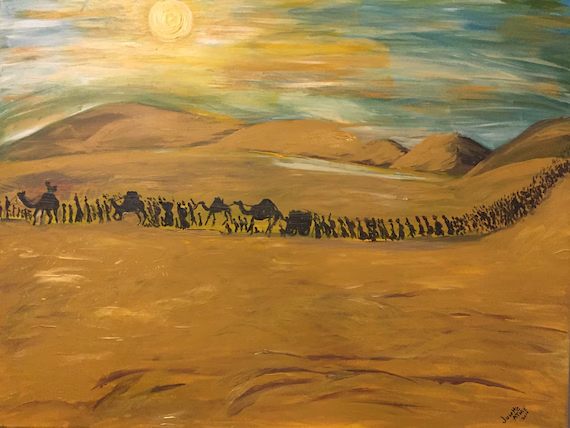Moses Saves his People
Moses grew up in the Pharaoh's Palace, and was treated just as if he were an Egyptian prince, but he never forgot he was a Hebrew It made him very sad and angry to see how cruelly the Egyptians treated the Hebrew people.
One day, he saw an Egyptian slave-driver savagely whipping a Hebrew man. After looking around to make sure that no one was watching.
Moses killed the Egyptian and buried his body in the sand. Moses thought he was safe, but someone had seen him. When the Pharaoh heard what Moses had done, he ordered his soldiers to kill Moses.
Hearing that his life was in danger. Moses escaped to the Midian desert. He lived there for a long time, working as a shepherd. One day, he saw a bush that seemed to be on fire, but wasn't burning up. Puzzled. Moses went to look at it.
Then Moses heard a voice. 'Do not come any closer, for you are on holy ground. Moses was very frightened.
Then the voice spoke again. 'I am your God. I am the God of Abraham. Isaac and Jacob. I have seen how cruelly the Hebrews are treated in Egypt. You must go the Pharaoh, and ask him to set them free. Take your brother Aaron with you.
The Pharaoh will not agree to let the people go, but I will make him. Then all the world will know that I am God.
You will lead the Hebrews to a good land where they will be free, and have plenty to cat.
Moses didn't want to go back to Egypt, but he knew he must obey God. He and Aaron went to the Pharaoh. 'The Lord God of Israel says you must let the Hebrews go free, said Aaron.
'I don't know your God. I will not let the people go, answered the Pharaoh.
He was so angry, he ordered that the Hebrews were to be made to work even harder than before.
Moses was in despair. He prayed to God for help. 'Go to the Pharaoh again, and warn him that if he does not let the people go.
I will make terrible things happen in Egypt, answered God.
Moses and Aaron went again to the Pharaoh, but he didn't believe the warning, and again refused to set the Hebrews free.
Then the terrible things began. First, the river Nile turned red and stinking, the fish died and no one could drink the water.
A week later, thousands of frogs swarmed out of the river, streams and ponds, finding their way into every corner of the Egyptians' houses.
Next, clouds of biting flies, then other flies, filled the Pharaoh's palace, and all the houses, except those of the Hebrews.
But still the Pharaoh wouldn't let the Hebrews go.
Then the cattle began to die, except in Goshen where the Hebrews lived, and all the Egyptians were ill, with horrible sores on their bodies.
After that, there were terrible storms: hail flattened all the crops in the fields, except in Goshen.
Next, great swarms of locusts ate everything green that was left.
They were followed by three days of total darkness, but still the Pharaoh wouldn't let the Hebrews go.
Then the very worst thing happened. The eldest son of every Egyptian family died in one night: every son from the Pharaoh's to the lowest slave.
The Hebrews were safe in Goshen because God had told them what to do. Earlier that evening, each Hebrew family had killed a lamb, and put a little of its blood on the doorposts of their house.
Then they had roasted the lamb, and eaten it with herbs and quickly-made flat bread. God said the Hebrews should always remember the night when death passed over them, and keep it, every year, as a special feast day, named the Passover.
The Pharaoh sent for Moses and Aaron. 'Take your people, and all your flocks and herds, and go, he said.
The Egyptians were now so frightened by the Hebrews, they gave them gold, silver, and fine clothes, and hurried them on their way.
The next day, all the Hebrews left Egypt. God led them to the Red Sea with a column of smoke to follow during the day, and a column of fire at night so they could see their way.
Then the Pharaoh changed his mind. He sent his army racing in chariots after the Hebrews.
When the Hebrews saw them coming, they were terrified. In front of them was the Red Sea, and behind them were the Pharaoh's soldiers.
Moses told them not to be afraid because God would help them. He pointed across the water, and a strong east wind, sent by God, blew away the water, making a dry path for them to hurry across.
When the Egyptian soldiers tried to follow them, the sea rushed back and all the soldiers were drowned.
The Hebrews were free, at last. Miriam played her tambourine, leading the women in a dance for joy.
Then they sang to God, praising Him for saving them from the Egyptian army and releasing them from slavery. Now they could travel on to the land which God had promised them.











Comments
Post a Comment